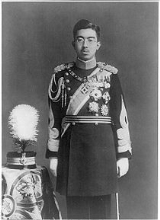
according to the traditional order, reigning from December 25, 1926, until his death in 1989. Although better known outside of Japan by his personal name Hirohito, in Japan he is now referred to exclusively by his posthumous name
Emperor Shōwa. The word Shōwa is the name of the era
that corresponded with the Emperor's reign, and was made the Emperor's own name upon his death.
At the start of his reign, Japan was already one of the great powers – the ninth largest economy in the world after Italy, the third largest naval country
, and one of the five permanent members of the council of the League of Nations
.
After pondering deeply the general trends of the world and the actual conditions obtaining in Our Empire today, We have decided to effect a settlement of the present situation by resorting to an extraordinary measure. We have ordered Our Government to communicate to the Governments of the United States, Great Britain, China and the Soviet Union that Our Empire accepts the provisions of their Joint Declaration.
![]()
To strive for the common prosperity and happiness of all nations as well as the security and well-being of Our subjects is the solemn obligation which has been handed down by Our Imperial Ancestors and which lies close to Our heart.
![]()
The hardships and sufferings to which Our nation is to be subjected hereafter will be certainly great. We are keenly aware of the inmost feelings of all of you. Our subjects. However, it is according to the dictates of time and fate that We have resolved to pave the way for a grand peace for all the generations to come by enduring the unendurable and suffering what is unsufferable.
![]()
Beware most strictly of any outbursts of emotion which may engender needless complications, or any fraternal contention and strike which may create confusion, lead you astray and cause you to lose the confidence of the world. Let the entire nation continue as one family from generation to generation, ever firm in its faith in the imperishability of its sacred land, and mindful of its heavy burden of responsibility and of the long road before it.
![]()
Unite your total strength, to be devoted to construction for the future. Cultivate the ways of rectitude, foster nobility of spirit, and work with resolution — so that you may enhance the innate glory of the Imperial State and keep pace with the progress of the world.
![]()

